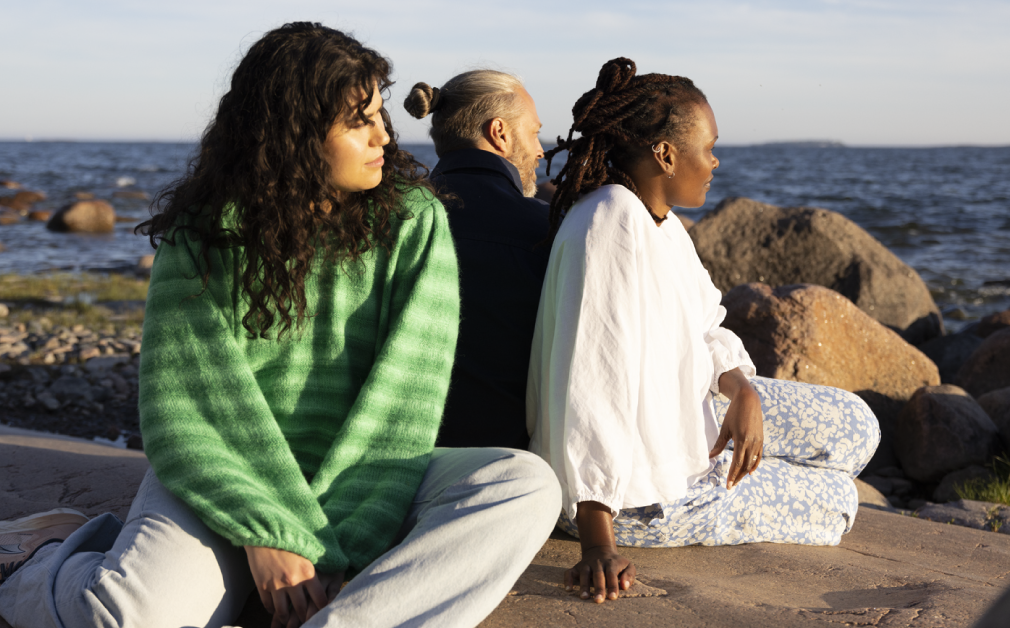Valerie Hoffmann, PhD. is the Head of Research at Meru Health
Elissa Epel, PhD. is the Director of the Aging, Metabolism, and Emotions Center at UCSF & Scientific Advisor to Meru Health.
When we think of depression and anxiety treatments, it’s common to consider medication and talk therapy. But what if there were choices we make in our daily lives that could have a similar – or even greater – impact on our mood? Meru Health’s Head of Research, Dr. Valerie Hoffman, sat down with Dr. Elissa Epel, the director of UCSF’s Aging, Metabolism, and Emotions Center and a professor at the department of psychiatry and behavioral sciences at UCSF. She also serves as a scientific advisor to Meru Health. Epel introduces us to the world of Integrative Mental Health and how food, movement, and supplements are some of the most underutilized and powerful mental health interventions.
This video interview has been edited and condensed for clarity.
Q
What is Integrative Mental Health?
A
Integrative Mental Health is a superior model for treating the common mental health problems we see most often today. We have an epidemic of mental health conditions: anxiety and depression are at clinical levels in over a third of our population. We shouldn’t label these “psychiatric disorders,” or “diseases” – these are normal, common responses to tremendous stress. We’re experiencing twin epidemics with racism and the virus, we have climate disasters…our future is going to be about dealing with crises and the unknown. Integrative Mental Health builds our resilience and boosts our overall health, so we can be healthy enough to cope well with the difficulties and stressors that life in this new world will throw at us.
Q
What does an Integrative Mental Health intervention look like?
A
Integrative Mental Health is a broad umbrella, but the main components are:
- Exercise
- Sleep
- Nutrition & supplements
We know that a regular program of aerobic exercise can really help mild-to-moderate depression. It’s so important for people to understand that if they can structure their exercise and keep up physical activity, that alone can be a type of antidepressant.
It’s also critical for people to be getting enough sleep. Poor sleep is a major highway between experiencing a lot of life stress and developing depression. We want to bolster people’s resilience by helping them prevent sleep loss from stress.
Nutrition and supplements are also an important part of mental health. It feels like this is an area where the public isn’t privy to the information they need. Having read these studies, it’s amazing how much more we can do to bolster people’s mental health with nutrition. For example, in many population studies, a junk food diet is associated with depression and anxiety, whereas a Mediterannean or whole food diet is associated with improved mental health. There are also some studies on supplements (like micronutrients) proving that they can help with a range of common issues like ADHD and depression. With improved nutrition, people even fare better when dealing with earthquakes or other natural disasters; they’re less likely to fall into severe depression or anxiety.
Q
How does Integrative Mental Health differ from a traditional view of mental health?
A
The traditional medical model uses medication as the first line of treatment. In my experience, there are so many problems with that approach. Common depression is not easily treated with drugs. In severe cases, it’s true that medication effects are often better than the placebo group. But with more mild depression, meta analyses suggest results are similar to or only slightly better than the placebo. This is really disappointing, because drugs are often the first line of defense for common depression, even when they’re not effective.
I don’t discourage people from trying medication if they want to – if they’re lucky, and the medications work on their brain, that’s great. But for most people, the cost-benefit analysis doesn’t work out: the benefit is minimal if any, and the cost comes in the form of side effects. Some drugs used for mental health conditions are addictive and hard to get off. The drug companies won’t admit how problematic these drugs can be and people end up suffering.
Q
It sounds like an Integrative Mental Health care approach has so many benefits, especially when compared with the traditional model. Can you tell us more about the scientific evidence behind Integrative care?
A
That’s the million dollar question. The short answer is yes, but there’s not a huge body of literature yet. We don’t have drug companies funding these studies, so we’re at a real disadvantage when it comes to running big multisite clinical trials.
But, yes, there’s absolutely an evidence base for many integrative mental health techniques; there have been a number of RCTs (randomized controlled trials), which are the gold standard for scientific evidence designed to eliminate bias. There are many trials and reviews when it comes to exercise and mental health. People are just starting to manipulate nutrition for depression, so that research is fairly new. It’s complicated, because depression isn’t necessarily caused by poor nutrition, so we may wonder why nutrition would help cure it. But the studies show that improving nutrition does improve mental health. One study showed that improving the diet of people with major depression led to much more remission than any drug study has found. And what’s interesting is that the control group was peer support, which is an active control group. It’s exciting that nutrition is one of the many integrative treatments gaining more research support.
There are different pathways to reducing our body’s stress response. In a stress-sensitive person, stressful thoughts and rumination can develop into depression. In these cases, mindfulness-based strategies are very helpful. Mindfulness-based Cognitive Therapy (MBCT) has been shown to be as effective as medications in some meta-analyses. It’s exciting to have MBCT on the map in the New England Journal of Medicine, which has a very high bar for evidence. It’s commendable and exciting that Meru Health has incorporated Mindfulness-based Cognitive Therapy into its platform. The fact that you’re pulling in integrative medicine techniques – recognizing that care isn’t one size fits all – is very unique.
Q
If someone wanted to start trying Integrative Mental Health techniques, where would they start?
A
I’d first want to know which different lifestyle habits they think are making them feel down or stressed and what they think helps improve their mood. I wouldn’t take someone who’s sedentary and start them with exercise. I think that could be a tough path, unless they really want to try it.
So, when someone asks, “what’s the best time of day to try meditation or exercise?” I’d answer: whatever time of day works best for you to make a habit.
We return to what we like. So, once we can get to a point where exercise actually feels good (it usually doesn’t feel good at the beginning, especially if we’re depressed) we get into this positive feedback loop: we exercise, experience the benefit, feel a sense of reward, and decide the next day to go out again for more exercise. So having feedback, pleasure, or a sense of meaning really helps us make these techniques into habits.
As far as where to start, I’d do a bit of a self assessment and say, “What do I do that’s the worst for me? What are my habits that are really hurting my health?” We’re looking for things like what you eat, how sedentary you are, how much you sleep or stress. And then, just start by choosing one. We all need an entry point. For example, for stress management it’s most helpful when people can start with something like a short daily yoga class to bring down anxiety. Then, that opens up opportunities and bandwidth to learn some new skills, like MBCT. Where’s the least resistance? What looks most appealing to you to try first?
Q
What led you to pursue Integrative Mental Health as your career?
A
I’ve been studying how stress gets under the skin and affects health for a long time – like how we eat, and how quickly we age on a cellular level. Those questions have led me to discover different natural techniques for how to really bring out the restorative power of our body and mind.
On the one hand, there are things we do that make us feel good that are also good for our physical health. On the other hand, there’s the quick pleasure of substance use, overeating, and comfort food – our brain can easily get hijacked by that addictive loop. This type of short-term pleasure can lead to uneasiness and a feeling of wanting more. In contrast, when we try these holistic things like yoga, meditation, and exercise, they are bringing us to a more balanced state where we can truly feel well.
And what does it mean to feel well? To feel energy, vitality, to feel “at ease”? There are two ways to get there:
- Relaxing, calming and restoring (through practices like yoga and meditation)
- Stressing the body in healthy, high arousal ways (like exercise)
These natural behaviors have antidepressant qualities too. I’m studying something called the Wim Hof method, inducing positive stress through rapid breathing and cold exposure. While in the moment it may feel like the opposite of relaxation, it’s through exciting the body that we recover. That recovery process is what we think creates restorative activities in the cells and in the brain that could be having antidepressant effects. There have been studies on other types of stressors like hyperthermia and infrared saunas that may have very potent antidepressant effects, possibly by reducing inflammation.
Q
This is such an exciting new frontier. Anything you’d like to leave us with?
A
It really is. These are new ways of thinking. What do I want for my body? What do I need? It’s all really about experimentation and trying things out. Something like MBCT alone is wonderful if people can really see things differently and adopt some of the mental techniques. For others, using some of the body techniques can be important, too. We need the whole toolbox.
Elissa Epel is a professor at the department of psychiatry and behavioral sciences at University of California, San Francisco. She is the Director of the Aging, Metabolism, and Emotions Center at the UCSF and has published groundbreaking research in the field of stress, aging, and obesity for over two decades. She also serves as a scientific advisor to Meru Health.
Valerie Hoffman holds a Ph.D. in Psychiatric Epidemiology from Johns Hopkins Bloomberg School of Public Health, and a Master’s degree in Public Health from Yale University. She has been studying psychiatric epidemiology for two decades and published over 70 peer-reviewed research papers. Valerie is the Head of Research at Meru Health, where she is part of developing a novel, technology-based integrated mental health solution to battle depression, anxiety, and burnout.
References:
Exercise and depression:
Imboden, C., Gerber, M., Beck, J., Holsboer-Trachsler, E., Pühse, U., & Hatzinger, M. (2020). Aerobic exercise or stretching as add-on to inpatient treatment of depression: Similar antidepressant effects on depressive symptoms and larger effects on working memory for aerobic exercise alone. Journal of Affective Disorders, 276, 866-876.
Morres, I. D., Hatzigeorgiadis, A., Stathi, A., Comoutos, N., Arpin‐Cribbie, C., Krommidas, C., & Theodorakis, Y. (2019). Aerobic exercise for adult patients with major depressive disorder in mental health services: A systematic review and meta‐analysis. Depression and anxiety, 36(1), 39-53.
Sleep and depression:
Fang, H., Tu, S., Sheng, J. and Shao, A., 2019. Depression in sleep disturbance: A review on a bidirectional relationship, mechanisms and treatment. Journal of cellular and molecular medicine, 23(4), pp.2324-2332.
Riemann, D., Krone, L.B., Wulff, K. and Nissen, C., 2020. Sleep, insomnia, and depression. Neuropsychopharmacology, 45(1), pp.74-89.
Nutrition and mental health:
Berk, M. and Jacka, F.N., 2019. Diet and Depression—From Confirmation to Implementation. Jama, 321(9), pp.842-843.
Gibson-Smith, D., Bot, M., Brouwer, I.A., Visser, M., Giltay, E.J. and Penninx, B.W., 2020. Association of food groups with depression and anxiety disorders. European journal of nutrition, 59(2), pp.767-778.
Jacka, F., O’Neil a., Opie R., et al, 2017. A randomised controlled trial of dietary improvement for adults with major depression (the ‘SMILES’ trial). BMC Med 15, (23).
Marx, W., Lane, M., Hockey, M., Aslam, H., Berk, M., Walder, K., Borsini, A., Firth, J., Pariante, C.M., Berding, K. and Cryan, J.F., 2020. Diet and depression: exploring the biological mechanisms of action. Molecular psychiatry, pp.1-17.
Cost-benefit analysis of medication for depression:
Klein, N. S., Wijnen, B. F., Lokkerbol, J., Buskens, E., Elgersma, H. J., van Rijsbergen, G. D., … & Nolen, W. A. (2019). Cost-effectiveness, cost-utility and the budget impact of antidepressants versus preventive cognitive therapy with or without tapering of antidepressants. BJPsych open, 5(1).
Ross, E. L., Vijan, S., Miller, E. M., Valenstein, M., & Zivin, K. (2019). The cost-effectiveness of cognitive behavioral therapy versus second-generation antidepressants for initial treatment of major depressive disorder in the United States: a decision analytic model. Annals of Internal Medicine, 171(11), 785-795.
Antidepressant addiction and withdrawal:
Jauhar, S., Hayes, J., Goodwin, G. M., Baldwin, D. S., Cowen, P. J., & Nutt, D. J. (2019). Antidepressants, withdrawal, and addiction; where are we now?.
Read, J. (2020). How common and severe are six withdrawal effects from, and addiction to, antidepressants? The experiences of a large international sample of patients. Addictive Behaviors, 102, 106157.
Efficacy of Integrative Mental Health:
Hale, M.W., Lukkes, J.L., Dady, K.F., Kelly, K.J., Paul, E.D., Smith, D.G., Heinze, J.D., Raison, C.L. and Lowry, C.A., 2019. Interactions between whole-body heating and citalopram on body temperature, antidepressant-like behaviour, and neurochemistry in adolescent male rats. Behavioural brain research, 359, pp.428-439.
Hendriks, T., de Jong, J. and Cramer, H., 2017. The effects of yoga on positive mental health among healthy adults: a systematic review and meta-analysis. The Journal of Alternative and Complementary Medicine, 23(7), pp.505-517.
Twomey, C., O’Reilly, G., Bültmann, O. and Meyer, B., 2020. Effectiveness of a tailored, integrative Internet intervention (deprexis) for depression: Updated meta-analysis. PloS one, 15(1), p.e0228100.
Wang, C.W., Chan, C.H., Ho, R.T., Chan, J.S., Ng, S.M. and Chan, C.L., 2014. Managing stress and anxiety through qigong exercise in healthy adults: a systematic review and meta-analysis of randomized controlled trials. BMC Complementary and Alternative Medicine, 14(1), p.8.
Mindfulness and depression:
Goldberg, S.B., Tucker, R.P., Greene, P.A., Davidson, R.J., Kearney, D.J. and Simpson, T.L., 2019. Mindfulness-based cognitive therapy for the treatment of current depressive symptoms: a meta-analysis. Cognitive behaviour therapy, 48(6), pp.445-462.
Segal, Z.V., Bieling, P., Young, T., MacQueen, G., Cooke, R., Martin, L., Bloch, R. and Levitan, R.D., 2010. Antidepressant monotherapy vs sequential pharmacotherapy and mindfulness-based cognitive therapy, or placebo, for relapse prophylaxis in recurrent depression. Archives of general psychiatry, 67(12), pp.1256-1264.



